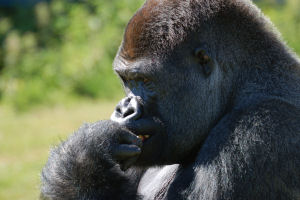The History of the Planet of the Apes
As the 2011 movie "Rise of the Planet of the Apes" tops the box office charts let us take a look at the interesting history of the Planet of the Apes theme.
Origin of Planet of the Apes
 The original story of Planet of the Apes is loosely based on the 1963 novel "La Plan¨te des singes" by French author Pierre Boulle.
The original story of Planet of the Apes is loosely based on the 1963 novel "La Plan¨te des singes" by French author Pierre Boulle.
The original "Planet of the Apes" movie released in 1968, starred Charlton Heston as NASA astronaut Colonel George Taylor stranded on a strange planet where apes are masters and humans are slaves. The movie did well at the box office and the prosthetic ape makeup won the the praise of critics and audiences alike.
The final scene of the 1968 movie is one of one of the most unforgettable scenes in science fiction movie history. Colonel Taylor is riding along the beach on horseback when he discovers a fractured Statue of Liberty on the shoreline. The movie ends with the revelation that this future world is earth.
The original Planet of the Apes movie would inspire four sequels. The first sequel was much lower budget, and it showed. In "Beneath the Planet of the Apes" (1970) , the apes battle human mutants in the subterranean ruins of New York City. The storyline is about survivors of a nuclear blast that continues the original movie's distant future scenario.
While Charlton Heston was clearly the star of the original Planet of the Apes movie, it would be the character of Cornelius played by Roddy McDowall that would dominate the sequels. In "Escape from the Planet of the Apes" (1971) , simian scientists Cornelius played by Roddy McDowall, and Zira played by Kim Hunter travel back through time to 20th Century Los Angeles. The plot followed the events in "Beneath the Planet of the Apes" and took the series in a new direction setting the stage for more sequels. Once again a lower budget movie that the original, that did not do all the well at the box office.
Roddy McDowall would return in "Conquest of the Planet of the Apes" (1972), as Caesar, the son of Cornelius. Surfacing after twenty years of hiding, Caesar would lead an ape revolution against humanity. With each film the production budget got smaller, as it shows in this film. Perhaps the least interesting and exciting movie of the series.
The series of films would end with "Battle for the Planet of the Apes" (1973). Roddy McDowall would once again star as the chimpanzee leader Caesar trying to bring order to the planet.
Planet of the Apes: The next generation
The next generation version, "Planet of the Apes" (2001), would rewrite the storyline while keeping the general theme intact. The movie was much less philosophical that the original, and played more like an action adventure film that a science fiction flick. At times when the remake made references to the original movie it seemed to be a parody of the original rather than a remake or reboot.
Director Tim Burton known for quirky themed movies such as "The Nightmare Before Christmas" and "Edward Scissorhands" directed the 2001 version of "Planet of the Apes". While the 2001 version of "Planet of the Apes" was a commercial success, it is not as well regarded as the original by science fiction fans. Burton declined to do a sequel.
Reboot 2011
The term reboot is the new buzzword in movies and media in the new millennium. It deals with taking familiar fictional themes and discarding much of the previous continuity in the series to start over. The 2011 movie "Rise of the Planet of the Apes" claims to be the reboot of the Planet of the Apes theme.
The 1963 novel by French author Pierre Boulle has been adapted to a series of movies from 1968 through 1973, which also lead to a short lived television series and cartoon series. It was reborn in 2001.
Time will tell how well the 2011 reboot will do, but the original theme of Planet of the Apes is alive and well in the large body of work it has inspired.